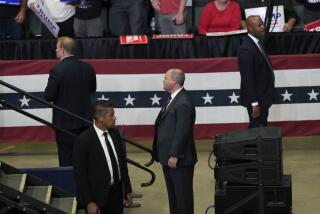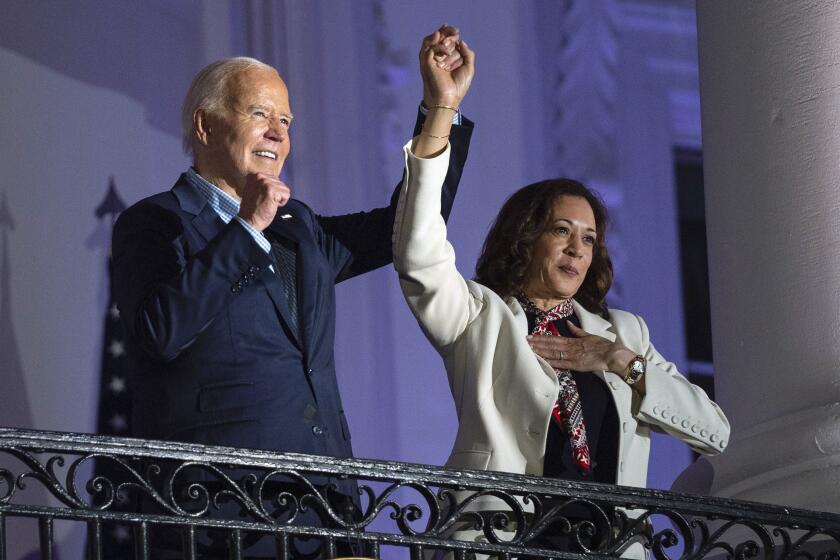Goldwater, Without Regrets : Looking Back on a Lifetime, the Man Who Was Always Right Concludes He Was Seldom Wrong
Right outside Barry Goldwater’s home, Be-Nun-I-Kin--”the house on the hill” in Navajo--is Camelback Mountain.
It is a looming heap of sandstone, 2 billion years old, and from Goldwater’s patio it looks like nothing more than that: a tumble of red rocks. To fully apprehend its shape, the outline of a recumbent dromedary, you have to get a good distance away and then turn and look back at it.
So it has become with Barry Goldwater himself.
After 30 years in the U.S. Senate, the frontiersman of conservatism, who seared politics and politicians with a tongue like a branding iron, has come back to the ageless desert. And as wind and sand smooth even the sharpest outcroppings of rock, so do time and circumstances change men.
Through the glass of time and distance, across years shaped by Vietnam and the Moral Majority, Oliver North and Ronald Reagan, the figure of Goldwater--the fire-eating 1964 presidential candidate cast as the boogeyman of nuclear apocalypse--has come to resemble something different. As the New Right tornado has swept the conservative revolution right on past the man credited with starting it all, Goldwater has by comparison taken on a softer patina: doggedly conservative still, but a man who stood or fell on his own terms--honorable, even moderate, and as decent and reliably honest as a Boy Scout compass.
“Damn, “ says the master of Be-Nun-I-Kin. “That hawk’s flying around.”
Barry M. Goldwater abruptly scoots his desk chair across the clear plastic floor mat and scowls out the vast window at the hawk.
For nearly 40 years, lesser creatures than it--politicians, newsmen, bureaucrats--have faltered under that forthright blue-eyed gaze, and presently, the hawk too glides safely out of sight. Goldwater leans back into his seat, momentarily mollified. “They pick up my little quail,” he explains. “I shoot ‘em once in a while.”
Barry Goldwater is at ease, and at home. Retired at the end of 1986 and widowed the year before that, the Grand Old Man of the Grand Old Party has, at 79, come back to Scorpion Hill, to Be-Nun-I-Kin.
Retired, but never retiring. This was the roistering teen-ager who put a hole in his father’s best whiskey barrel with his mother’s pistol; the gunpowder-and-vinegar senator who shot down challenger after challenger with plain frontier talk; the maverick presidential candidate who blasted himself in the foot so often with quick-draw pronouncements, like proposing to saw off the Eastern Seaboard and float it out to sea, that a Senate colleague awarded him the motto “Ready, fire, aim!”
And still, everything that comes along is a clay pigeon for his target practice. In the space of an hour, a visitor can hear:
--To his assistant, handing her a tape some admirer had sent him: “I don’t want to sit and listen to that stuff. It’s poetry .”
--About “dug-up” allegations that Sen. Dan Quayle “shacked up with some girl” in Florida: “Well if they’re gonna apply that as a criterion, there’d be no politicians left!”
--Congress and foreign policy: “Sadie, lock the door; 535 people that have a hard time spelling their names, I don’t want them running my country.”
--On segments of the New Right: “They’re nuts.”
Goldwater was once the nut: “In your heart you know he’s right,” his 1964 campaigners cheered. “In your guts you know he’s nuts,” his detractors jeered.
But as the years have whittled away at his body--15 operations, two plastic hips, an artificial knee and a triple heart bypass--they have added to his stature among his peers and his public.
At the climax of Watergate, when Goldwater finally gave up on Nixon, many in the U.S. Senate and millions of Americans gave up on Nixon too, and Nixon resigned. This year, when Goldwater withdrew his support of Arizona Gov. Ed Mecham, saying he had “screwed up” too much, thousands of Arizonans agreed. And Goldwater, who once suggested Jerry Falwell deserved “a swift kick in the ass,” has sometimes found himself looking positively moderate by contrast.
“I don’t call these New Rightists all nuts but they expect from conservatism some things that no political philosophy should or could deliver.
“I was pretty young when I went there (to Washington) and pretty old when I got out. I think most of the changes were just the years gone by.”
Sixty years ago, Barry Goldwater dropped out of college to run the family store after his father died. Now he holds the Barry Goldwater Chair of American Institutions at Arizona State University, a syllabus of “bull sessions” with “smart as hell” students who give him a better back-and-forth than did most senators, who “just read what somebody put on their desks. . . .”
And there is his new book, “Goldwater,” a nostalgic autobiography and acerbic political memoir, latest in a publishing line that began in 1960 with “Conscience of a Conservative.”
Pundits are reading it with relish, brandishing its vintage Goldwaterisms like heads on pikes: Richard Nixon, “the most dishonest individual I have ever met.” Former Defense Secretary Robert McNamara, a “bean and body counter.” One-time L. B. J. aide Bill Moyers, “Every time I see him, I get sick to my stomach and want to throw up.”
“Oh, I think it’s gonna sell like hell,” Goldwater says cheerfully. “I think it’ll make a lot of people mad ,” he adds with a hopeful, happy lilt in his voice at the prospect. “I think Robert McNamara’s gonna have a fit. I tried to be nice to Lady Bird Johnson because I like her very much, but her husband was no good. On the whole I was pretty nice to people.”
So life is as busy as the Senate, with better scenery: the phone rings endlessly, the discarded Federal Express envelopes pile up in the wastebasket, the week’s typed schedule directs his days. His granddaughter wanted help on a school paper about Dan Quayle, the chimney cleaners were coming at the end of the week, and he sails for Italy after that. “I’m still trying to find out what the hell retirement is all about,” he grouses. “I’ve never worked so hard in my life .”
The Goldwater compound--sleek house, radio shack, hot tub strictly for therapeutic purposes--is on the crest of a dozen acres at the end of a prickly pear-lined driveway.
On the north are the Unitarian and Episcopal churches built on land the Goldwaters donated. Peggy Goldwater’s ashes are in a crypt of the latter, in line of sight of the house where she often stayed while her husband’s business took him elsewhere. To his lasting grief, he didn’t get home for good until after she died.
Only the name under the doorbell declares this to be anything more than the home of a Western gentleman with the means and leisure to indulge his hobbies--for Goldwater, aviation, photography, Indian tribal concerns and ham radio, which served to keep politics in perspective and at bay.
Inside, from his cockpit-like living room command post, fitted out with mounted scope, mega-lens camera and radio set, Goldwater can scan horizon to horizon across the smog-hazed Valley of the Sun, can fix on the spot in downtown Phoenix where he was born when this was the Arizona Territory.
Walls and shelves bear paintings and pictures gathered over the years from his beloved Arizona--the newest his own serene photo of the remote white sandstone arch the Navajos have named for his wife. The Goldwaters, on one of their 51 wedding anniversaries, camped there with a chocolate cake and five bottles of champagne.
Some of the Indian artwork was picked up a half-century ago for two bits; some are museum-quality pieces.
But one sees nothing of politics here--not a framed testimonial, not a gilded gavel--nothing to attest that 24 years ago, this man ran hopelessly, quixotically, for President, knowingly committing electoral suttee so the Republican Party might arise in a conservative rebirth that still roils the nation; that this man was chief pallbearer for Nixon’s presidency at the end of Watergate; that this was the cactus-tongued conscience of the Senate and his party, speaking his mind even when his enemies said they doubted he had one. Not a trace.
“And you won’t,” Goldwater says shortly. “This is where I live . I think the only thing I have of Washington around here might be an ashtray--and nobody smokes in this house.” Not any more, his pause says. Not since his wife, a longtime smoker, died.
He gave most of the souvenirs away, to aides, to friends, to museums, schools, the Air Force Academy. As for “that Capitol, I don’t care if I ever walk in it again in my life.”
Anyway, it needs no photos to prod visitors’ memories. Goldwater’s has always been a face of Mt. Rushmore proportions, all granite brow and chin. In age, its profile is sharper still, and the skin browned by the Southwest sun.
And those black horn-rimmed glasses--once so recognizable that campaign buttons bore just the spectacles, nothing else--are bifocals nowadays. There is another pair he keeps for TV interviews, with no glass in them at all. It is probably the only concession he makes to the show-biz demands of media.
Goldwater is in golf shirt and slacks, tasselled moccasins and no socks. The grip of his walking stick, bought in London, bears a carved mastiff’s head. The stick’s rubber tip anchors him as he leans, moving along the sand-colored carpet with conscious effort and apparent pain. His hearing is a little faded, and people on the phone must speak up, or the former senior senator from Arizona is likely to hang up after a couple of brusque “Hellos?”
A Pritikin regimen, “best thing I ever did,” has restored to him the cholesterol count of a stripling, but it meant goodby to the sociable tumbler of bourbon, to the cheeseburger with raw onion like those he ate at his Senate desk.
He is allowed to walk uphill, but not downhill. Some mornings he drives himself to the gym in his pampered black 1969 Javelin AMX, its K7UGA plates his ham-radio call letters. For decades he has tinkered with it; like anything else at Be-Nun-I-Kin--clocks, toasters, radios--if it plugs in, turns on or lights up, Goldwater has probably built it, fixed it or taken it apart and put it together again. Nowadays, the car’s high-tech gadgetry--aircraft compass, a jet fighter altimeter--are about the closest Goldwater comes to flying a jet.
Still Flying
Sixty years a pilot, he still flies borrowed planes and helicopters. But not the jets he has loved from the days when he organized the Arizona Air National Guard, was an Air Force reservist and the Air Force’s champion in the Senate. Jets, he says sorrowfully, as if abandoned by old friends--”they pull more gravity forces, Gs, than I like to pull. I’ve had open heart surgery. I don’t want those tubes coming loose.”
This afternoon, the phone rings; it is his old friend, Nevada Sen. Paul Laxalt.
“Hey, Pablo! I’m not worth a damn, how are you? . . . I hear you want me to do something. . . . Look, you sonofabitch, you can’t think up anything I don’t know about. You want me to come back there and do a television show. . . . How much you gonna pay me? I’m just teasing you. . . . OK, Paul, OK. Por nada. Adios. “
A lot of his friends, like a lot of his attitudes, would not pass muster with the New Right. Ben Bradlee, executive editor of the “liberal” Washington Post. Ted Kennedy and his late brother, John, and Arizona Rep. Morris Udall, all Democrats, all cherished. The late Hubert Humphrey, “my dearest friend, and we used to fight like cats and dogs, but we always got along.” Men who gave as good as they got in the days when everybody fought clean and then went out friends.
The New Right wouldn’t like it either that Peggy Goldwater founded Planned Parenthood in Arizona. He doesn’t like abortion, but likes even less any law interfering with “what I happen to believe is a decision that is up to the woman.”
Goldwater, pegged in 1964 as a social Neanderthal toting atomic six-shooters, by 1988 was saying that Mecham’s backers were so far to “the extreme right” that “these people look on me as a Socialist.”
In 1984, as chairman of the Senate Intelligence Committee, he wrote to CIA director William Casey that he was “pissed off!” at the “act of war” of secretly mining Nicaraguan harbors. He proposed closing certain military bases and, in his proudest Senate achievement, streamlined the clunky military chain of command. He has his doubts about Reagan’s “Star Wars,” and railed as loudly against the White House men who sold arms to Iran as at grandstanding congressmen who leaked security secrets.
But things just don’t rile him like they used to. “As the years go by you stop to reflect, and you think, and sometimes you mellow,” he says. Even Rod McKuen is “a helluva poet.” Even the Communists are worth talking to, carefully.
“I want to go to Russia and meet Gorbachev. I’ve wanted to go to Russia ever since World War II but they’ve always indicated they didn’t think I’d be welcome.
“All I want to do is go there, shake hands, talk to him and come back. . . . I have a strong feeling that Gorbachev is the new Russia. He knows, and we know that he knows, that his economy is a far greater enemy to the future of Russia than America or any other country.”
But make no mistake, this is still the foe of communism, partisan scourge of big government and inept government, lamenting that more laws get passed than repealed.
--Congress. “All people really want to go to Congress for is a good job, and they want to make sure that job goes on and on.”
--Competition. “Why aren’t we still head man? . . . Why do people buy Japanese, Korean automobiles? Because they’re better made. My God, you see Ford calling back 200,000 cars because a steering knuckle doesn’t work, that’s just plain laziness.”
--Republicans. “My feeling is this election might be the last successful election for the Republicans, just because we’re going around in a cycle.”
--Fear of speaking out (not by him). “The whole field of public relations pretty much created that feeling. . . . There are public relations firms all over this world. We got dozens of ‘em right downtown. If I wanna hire one, he’ll be right out here. If I wanted to give you an interview, they’d probably say, Oh no, don’t do it, don’t let her talk to you. I think we ought to make up our own minds, do what we please.”
His ornery lip and his bullwhip zingers made his reputation, good and bad. With no heed for the niceties of political timing, Goldwater--the man who had integrated the Arizona Air National Guard and his department store staffs--in the middle of running for president, cast the sole Senate vote against the 1964 Civil Rights bill, because he thought it was unconstitutional. He stood in retirement-haven Florida and took a swipe at the Social Security system. He flew to Knoxville and proposed selling the Tennessee Valley Authority.
Never one to hold back the touchy stuff, his book, like his interviews, covers ground that he has covered before, about Nixon, Johnson, Reagan. But there is one thing in the book he had told no one but his wife. He didn’t want to run for President. And he knew he would lose. But he did it anyway.
Defeat Was Inevitable
Even as he wrote his acceptance speech in San Francisco he knew Johnson “could not be defeated by any Republican. The main reason was not Johnson but that the country was not ready for three presidents in two years, and we all understood that. My effort became an effort to take the control of the Republican Party away from the Eastern Seaboard and move it here to the Rocky Mountains and the West. And we did.”
It was a true-believer, take-no-prisoners moment, and he said “the phrase”: “Extremism in the defense of liberty is no vice, and moderation in pursuit of justice is no virtue.”
Twenty years later, when he spoke at the Dallas GOP convention, organizers went all watery at the knees at the thought Goldwater would say it again. He did, after threatening to go home if anyone tried to stop him.
“Most of them have come around to understand that it’s a helluva good speech. It should be--I stole it from Socrates,” and Cicero stole it from Socrates and Thomas Paine borrowed from them both. “I always said if you’re gonna steal a speech, go waaay back. I wrote Joe Biden a letter. I said ‘Joe, next time you wanna steal, go back .’ ”
“The speech” fertilized the field for “the ad,” what Goldwater calls “that bomb thing,” the most devastating spot in TV history. A little girl is plucking daisy petals to a soft-voiced countdown to a mushroom cloud. It ran only once, but there was no doubt what it meant.
After a campaign in which even fellow Republicans refused to appear with him, one that portrayed him as a radical whose presidency would ignite racial holocaust, he lost in one of the worst drubbings in history.
He wouldn’t have liked being President, anyway. “I really wouldn’t. Ike told me one day that he had signed 1,300 signatures. Now that takes all day. So when do you have time to sit down and worry about the world?”
Better that he was cast in the chorus, something of an irascible Cassandra, warning and scolding, champion of less-is-more conservatism, inexorable defender of military might and American right. Within a few years of 1964, after the Tet Offensive and the draft, a joke of sorts began making the rounds: They told me that if I voted for Goldwater we’d go to war in Vietnam. Well, I did, and they were right.
“Once in a while I have people tell me that I was right,” he says now. “It doesn’t make that much difference. (But) It’s nice to hear things like that.”
He looks out across the valley again, his eye caught by its myriad new buildings glossy in the full glare of late-summer sun. New people by the thousands live and work in those buildings. They are a new kind of Arizonan, few rough edges and lots of air conditioning, and in the last election, in 1980, they almost voted Barry Goldwater out.
“The only thing I want them to remember me by is, I was honest, and I tried my best. The legislation I authored, some of it was damn good, and some of it didn’t amount to a hill of beans. But I have no regrets of my service, I did everything I could.”
In 1949, Goldwater--whose grandfather, a Polish Jewish dissident, ran a saloon below a bordello in the Sierra foothills before heading for Arizona--won his first election, to the Phoenix City Council.
He wrote a letter, cited in his book, to his brother and his store manager to explain why he was doing it. “Don’t cuss me too much,” the letter ends. “It ain’t for life, and it may be fun.”
On the New Right
‘I don’t call these New Rightists all nuts, but they expect from conservatism some things that no political philosophy should or could deliver.’
On the Soviets
‘I want to go to Russia and meet Gorbachev . . . shake hands, talk to him and come back. . . . I have a strong feeling that Gorbachev is the new Russia.’
On His Service
‘I was honest and I tried my best. The legislation I authored, some of it was damn good, and some of it didn’t amount to a hill of beans.’
On the Presidency
‘Ike told me one day that he had signed 1,300 signatures. Now that takes all day. So when do you have time to sit down and worry about the world?’
More to Read
Sign up for Essential California
The most important California stories and recommendations in your inbox every morning.
You may occasionally receive promotional content from the Los Angeles Times.







